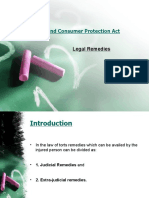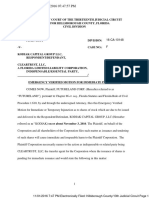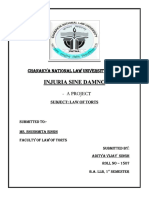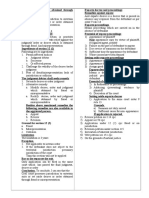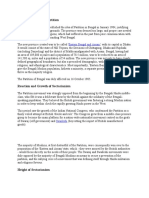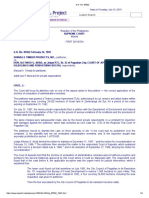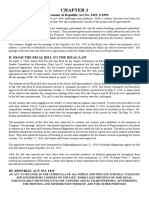Injunctions: Temporary Injunction: These Type of Injunctions Are Granted
Uploaded by
Vishakh NagInjunctions: Temporary Injunction: These Type of Injunctions Are Granted
Uploaded by
Vishakh NagINJUNCTIONS
Injunction is an order by the court to restrict an act or to do an
act. It is a legal remedy.
Precise definition of Injunction has been given by Halsbury:
An injunction is a judicial process whereby a party is ordered to
refrain from doing or to do a particular act or thing.
Burneys definition of injunction.
Injunction is judicial process by which one who has invaded or
threatens to invade the rights, legal or equitable of an another is
restrained from continuing or commencing such an wrongful act .
The above definition expresses prohibitory injunction.
Injunctions can be issued for and against individuals,public bodies
or even state.
The nature of discretion and rules for awarding injunctions is the
same that of English Courts in Indian Courts.
Grant of Injunction is discretionary with the court.
There are two types of Injunctions:(1)Temporary Injunction.
(2)Perpetual or permanent Injunction.
Temporary Injunction:
These type of injunctions are granted
for a specific time,or until the the further court order.These type
of Injunctions can be granted at any time.(even before filing and
judgement of the suit).It is given before the conclusive rights of
the parties have been decided.
The procedure for granting Temporary Injunction is governed by
the rule 1 and of Order 39 of the Civil Procedure Code.
Rule 1 of order 34 of CPC governs injunctions regarding the
protection of interest in property
1. Cases in which temporary injunction may be granted.- Where in any Suit it is proved by affidavit or
otherwise
(a) that any property in dispute in a suit is in danger of being wasted, damaged or alienated by any party
to the suit, or wrongfully sold in execution of a decree, or
(b) that the defendant threatens, or intends, to remove or dispose of his property with a view to defrauding
his creditors,
(c) that the defendant threatens to dispossess the plaintiff or otherwise cause injury to the plaintiff in
relation to any property in dispute in the suit,the court may by Order grant a temporary injunction to
restrain such act, or make such other Order for the purpose of staying and preventing the wasting,
damaging, alienation, sale, removal or disposition of the property or dispossession of the plaintiff, or
otherwise causing injury to the plaintiff in relation to any property in dispute in the suit] as the court thinks
fit, until the disposal of the suit or until further orders.
2. Injunction to restrain repetition or continuance of breach.- (1) In any suit for restraining the
defendant from committing a breach of contract or other injury of any kind, whether compensation is
claimed in the suit or not, the plaintiff may, at any time after the commencement of the suit, and either
before or after judgment, apply to the court for a temporary injunction to restrain the defendant from
committing the breach of contract or injury complained of, or any breach of contract or injury of a like kind
arising out of the same contract or relating to the same property or right.
(2) The court may by Order grant such injunction, on such terms, as to the duration of the injunction,
keeping an account, giving security, or otherwise, as the court thinks fit.
As per s.36 of the Specific relief Act Injunctions are granted at the
discretion of the court.The court will grant Injunction if the
following conditions are satisfied:
1. The plaintiff must establish a prima facie case.He is not
required to make out a clear title but he must establish that
there is a substantial question to be investigated and that
matters should be preserved in status quo until the
injunction is disposed of.
2. An irreparable injury would result if the injunction would be
refused and that there is no other remedy open to applicant
by which he could protect himself from the consequences of
the apprehended injury.
3. The conduct of the Plaintiff has not been blame worthy.
4. The balance of convenience requires that the injunction
should be granted.
In a suit where there is no permanent Injunction sought
for,in the final analysis, ordinarily a temporary Injunction
cannot be granted.1 This was again affirmed in Ishwarbhai v
Bhansauli 2
Disobedience or breach of injunction is punishable in
law.Any person found guilty in breach or disobedience of
injunction,his property will be attached or detained in a civil
prison for not more than three months or until unless the
court directs for his release.The property cannot be attached
for more than a year.If the breach or disobedience
continues, the attached property can be sold and the part of
the proceeding is paid by the court to the plaintiff, as
deemed to be fit as compensation and balance to the party
thereto.
The object of the interlocutory Injunction is to protect the
plaintiff against the injury by violation of his right for which
he could not be adequately compensated in damages
recoverable in the action if the uncertainty were resolved in
his favour at the trial.3
PERMANENT INJUNCTION
1 Gujrat Electricity board v Maheshkumar, AIR 1982 GUJ 289
2 AIR 2002 Guj 328
3 Gujrat Bottling Co.Ltd. v. Coca Cola Company (1995) 5 SCC 545
Also known as perpetual injunction can only be granted by
the decree made at the hearing and upon the merits of the
suit. A regular suit is required to be filed in which the claim
exercised by the plaintiff is examined on merits before
permanent injunction is granted. Permanent Injunction
decides the rights of the parties whereas the Temporary
injunction does not. A permanent Injunction forbids the
defendant from asserting a right or committing an act which
would be contrary to the rights of the plaintiff.
As per s.38(3) of the Specific Relief Act Permanent Injunction
is granted:
(3) When the defendant invades or threatens to invade the plaintiffs right to, or
enjoyment of, property, the court may grant a perpetual injunction in the following
cases, namely:
(a) where the defendant is trustee of the property for the plaintiff;
(b) where there exists no standard for ascertaining the actual damage caused, or likely to
be caused, by the invasion;
(c) where the invasion is such that compensation in money would not afford adequate
relief;
(d) where the injunction is necessary to prevent a multiplicity of judicial proceedings
The conditions prerequisite to the applicability of this section are:1. There must be legal right express or implied in favour of the applicant;
2. Such a right should be violated or there should be threatened invasion;
3. Such a right should be an existing one;
4. The case should be fit for the exercise of courts discretion.
Inconvenience likely to result from granting injunction is greater than
that which is likely to arise from withholding it ,injunction shall not be
granted;
5. It shouldnt fall within the ambit of restraining provisions contained in
s.41 of Specific relief Act.
MANDATORY INJUNCTION
The Court in its discretion may compel the performance of
certain acts to prevent the breach of complained act which
it is capable of enforcing.
This type of Injunction is strictly confessed to cases where
the remedy of damage is inadequate for the purpose of
justice and restoring of things to their former condition is the
only remedy which will meet the requirements of the Case. 4
If positive covenants cannot be enforced it doesnt preclude
the court from enforcing negative covenants.
Ex-In a contract with a singer to sing at a place A and not to
sing at any other place other than A.If the singer refuses to
perform at place A,the court cant force her to sing at A for
the period of one year as it is a service personal in nature
and she cannot be compelled to perform it,but the court can
grant an injunction from preventing her to sing at any other
place than A.
AD INTERIM INJUNCTION
An AD-Interim Injunction is an Injunction which is either
granted ex-partee or without giving the defendant a change to
argue. It is given during the pendency of an application as
opposed to perpetual which is given during the pendency of the
suit. Usually in rent cases where the owner agrees that the
plaintiff/ is the tenant of the property in question,Injunction is
granted against the owner so that he does not disposes,sell or
remove the tenants from the property in question.
There is no straight-jacket formula for in grant for injunctions and
it depends from case to case and circumstances.
4 C.Kunhammad v.C.H.Ahamad Haji
In Damodar Valley Corporation v. Haripada Das and ors. 5 at Para 5
The principle governing grant of ad interim injunction appears to be as
follows:
(i) It is not necessary for grant of ad interim injunction on a balance of
convenience that the plaintiff should succeed in establishing
a prima facie case or a probability that he would be successful at
the trial of the action.
(ii) It is also no part of court's function at that stage of the litigation to
resolve conflicts on evidence on affidavits as to facts on which the
claims of either party may ultimately depend nor to decide difficult
question of law which call for detailed argument and mature
consideration which is reserved for the trial. All that is necessary at
that stage on the evidence on affidavits is that the court should be
satisfied that the claim is not frivolous or vexatious, in other words
there is a serious question to be tried.
(iii) On such satisfaction, the court will consider whether the plaintiff if
he succeeds, would be adequately compensated by an award of
damages for the loss it the defendant continued to do what was
sought to be injuncted. If damages recoverable in law is an
adequate remedy and the defendant is in a financial position to pay
them, no interlocutory order should be normally granted however
strong the plaintiff's claim appear to be at that stage.
(iv) If damages are not an adequate remedy to the plaintiff in event of
his success at the trial the court will consider if the defendant
5 AIR 1978 Cal 489
would be adequately compensated if he succeeds in his case, by
reason of the plaintiffs undertaking for damages for the loss caused
by reason of the injunction. If such damages are adequate remedy
and the plaintiff is in a financial position to pay them, an
interlocutory injunction should not be refused.
You might also like
- Role of Magistrate in Criminal Investigations by Bharat Chugh100% (10)Role of Magistrate in Criminal Investigations by Bharat Chugh18 pages
- Defendant's Memorandum of Law in Support of Motion To Certify The Court's March 24 Opinion and Order For Interlocutory Appeal and To Stay DiscoveryNo ratings yetDefendant's Memorandum of Law in Support of Motion To Certify The Court's March 24 Opinion and Order For Interlocutory Appeal and To Stay Discovery15 pages
- THE LABOUR LAW IN UGANDA: [A TeeParkots Inc Publishers Product]From EverandTHE LABOUR LAW IN UGANDA: [A TeeParkots Inc Publishers Product]No ratings yet
- 4-Principles of Mandatory Injunction - by SMT R HarikaNo ratings yet4-Principles of Mandatory Injunction - by SMT R Harika7 pages
- Torts Important Cases: Chapter 1 - Nature of A TortNo ratings yetTorts Important Cases: Chapter 1 - Nature of A Tort14 pages
- Law of Torts and Consumer Protection Act: Legal Remedies100% (5)Law of Torts and Consumer Protection Act: Legal Remedies53 pages
- A. Federal Courts Have Jurisdiction If Either B or C Is Met. Start With Constitutional Basis For B. Diversity Jurisdiction (1332)No ratings yetA. Federal Courts Have Jurisdiction If Either B or C Is Met. Start With Constitutional Basis For B. Diversity Jurisdiction (1332)23 pages
- Drafting Pleading and Conveyancing Answersheet 8th SemNo ratings yetDrafting Pleading and Conveyancing Answersheet 8th Sem33 pages
- Dr. Melvin Hale's Opposition To Emporia State University's Motion For Judgment On The Pleadings 4/10/17 (Highlighted)100% (2)Dr. Melvin Hale's Opposition To Emporia State University's Motion For Judgment On The Pleadings 4/10/17 (Highlighted)30 pages
- Motion For Temporary Injunction 06fdf892 7521 46dc A7e1 E5f41ba1465eNo ratings yetMotion For Temporary Injunction 06fdf892 7521 46dc A7e1 E5f41ba1465e19 pages
- Rectification or Cancellation of InstrumentsNo ratings yetRectification or Cancellation of Instruments13 pages
- A. Preventive Relief: 1. INJUNCTIONS (O. 29 RHC 2012)No ratings yetA. Preventive Relief: 1. INJUNCTIONS (O. 29 RHC 2012)16 pages
- Difference Between Fraud and Misrepresentation (With Examples and Comparison Chart) - Key DifferencesNo ratings yetDifference Between Fraud and Misrepresentation (With Examples and Comparison Chart) - Key Differences11 pages
- Law of Torts, Motor Accident Claims and ConsumerNo ratings yetLaw of Torts, Motor Accident Claims and Consumer133 pages
- Restitution of Conjugal Rights PetitionNo ratings yetRestitution of Conjugal Rights Petition30 pages
- Professional Misconduct Under The Advocates Act, 1961100% (1)Professional Misconduct Under The Advocates Act, 19615 pages
- Preventive Relief Purpose & Scope Governing Principles Equitable PrinciplesNo ratings yetPreventive Relief Purpose & Scope Governing Principles Equitable Principles24 pages
- Litigation to Life: An Injury Victim's Guide to Navigating the Settlement ProcessFrom EverandLitigation to Life: An Injury Victim's Guide to Navigating the Settlement ProcessNo ratings yet
- Process Accounting: FOR THE BOOKS OF .. Process Accounts/CostingNo ratings yetProcess Accounting: FOR THE BOOKS OF .. Process Accounts/Costing1 page
- Injunctions: Temporary Injunction: These Type of Injunctions Are GrantedNo ratings yetInjunctions: Temporary Injunction: These Type of Injunctions Are Granted7 pages
- Limitation of Personal Capacity in 21st CenturyNo ratings yetLimitation of Personal Capacity in 21st Century11 pages
- Anson Avery Maynard v. Gary Dixon, Warden, Central Prison, Raleigh, NC Lacy H. Thornburg, Attorney General of North Carolina, 943 F.2d 407, 4th Cir. (1991)No ratings yetAnson Avery Maynard v. Gary Dixon, Warden, Central Prison, Raleigh, NC Lacy H. Thornburg, Attorney General of North Carolina, 943 F.2d 407, 4th Cir. (1991)19 pages
- (1935) Privileged Characters: Teapot Dome Scandal100% (1)(1935) Privileged Characters: Teapot Dome Scandal536 pages
- Slann 2011 Sovereignty and Jurisdiction in The Airspace and Outer SpaceNo ratings yetSlann 2011 Sovereignty and Jurisdiction in The Airspace and Outer Space2 pages
- Certified List of Candidates For Congressional and Local Positions For The May 13, 2013 2013 National, Local and Armm ElectionsNo ratings yetCertified List of Candidates For Congressional and Local Positions For The May 13, 2013 2013 National, Local and Armm Elections2 pages
- Sunville Timber Products Inc Vs Abad G.R. No. 85502No ratings yetSunville Timber Products Inc Vs Abad G.R. No. 855024 pages
- R. W. Seton-Watson, King Alexander's Assassination, Its Background and Effects, International AffairsNo ratings yetR. W. Seton-Watson, King Alexander's Assassination, Its Background and Effects, International Affairs29 pages
- International Humanitarian Law (Power Point)100% (1)International Humanitarian Law (Power Point)22 pages
- CLEEN Study Into Prevalence of Police Misconduct - 2 2No ratings yetCLEEN Study Into Prevalence of Police Misconduct - 2 2106 pages
- Challenges and Solutions For EU Battlegroup Deployment Within The Existing Legal FrameworkNo ratings yetChallenges and Solutions For EU Battlegroup Deployment Within The Existing Legal Framework5 pages
- 6 Right To Free and Compulsory Education-51-67No ratings yet6 Right To Free and Compulsory Education-51-6717 pages
- 1 D.P. Gupta Virtual Trial Advocacy Competition, 2020: THE Hon'Ble Court OF Session, JaipurNo ratings yet1 D.P. Gupta Virtual Trial Advocacy Competition, 2020: THE Hon'Ble Court OF Session, Jaipur5 pages
- 10 January 2024: Dswd-Gf-010a - Rev 00 - 22 Sep 2023No ratings yet10 January 2024: Dswd-Gf-010a - Rev 00 - 22 Sep 20233 pages
- Soc101 - Activity 2 (The Structures of Globalization) SacuratNo ratings yetSoc101 - Activity 2 (The Structures of Globalization) Sacurat3 pages












